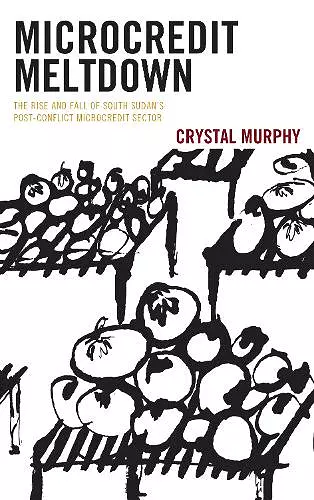Microcredit Meltdown
The Rise and Fall of South Sudan's Post-conflict Microcredit Sector
Format:Hardback
Publisher:Bloomsbury Publishing PLC
Published:3rd Dec '18
Currently unavailable, and unfortunately no date known when it will be back

Established to help people jumpstart their lives and economy after over a half century of conflict, the South Sudanese microcredit sector collapsed in 2012, six years after its takeoff, to the detriment of some 80,000 participants. Microcredit Meltdown is an account of the ambitious launch and premature downfall of the Southern Sudanese microcredit industry.
Through a mixed methods ethnographic approach, the book charts the state and non-state actors that embarked upon economic development after war, the assumptions built into microlending, and the impact of ideologies and social norms on economic practice. The text compares industry theories with the experiences of borrowers and finds that microcredit failed in South Sudan due to false assumptions that were inapplicable to this post-conflict environment.
Yet the over promising and under-delivering commercial microcredit was not isolated to South Sudan or even post-conflict settings. The Juba microcredit story is an instance of the broader global shift toward the commercial microcredit model. Initiated to get badly needed capital into the hands of poor people, instead the focus became sustaining a lending program. The text shows how the ideological and material constraints of the commercial microcredit paradigm were woefully misaligned with local socio-cultural realities, and created the collapse in South Sudan.
This study of post-independence Juba, its depressed and challenged economy in post-war South Sudan, describes how people survive and how microcredit institutions can learn from this case. It argues that South Sudan is not the Grameen Bank’s Bangladesh and that there is no “cookie cutter” model for success in microcredit loans. It critiques neoliberal economics and is valuable for practitioners, addressing the controversy between lending to the ultra-poor or to marginally prosperous. In a social context where social ties are valued over borrower repayment and are weakened by hyperinflation and import dependence, the author concludes that microfinance is in need of accommodation to specific contexts. It argues that microfinance institutions are beholden to debt ratings, problematic metrics and external constraints from non-local lenders and calls for revisiting microfinance in post-conflict environments. -- Carolyn Fluehr-Lobban, Professor Emerita of Anthropology, Rhode Island College
In a voice that is fair, introspective and unique, Dr. Murphy explores the rapid rise and sudden fall of the microcredit industry in the early years of post-conflict Sudan. Committed to a particular understanding of social groups as the linchpin of microcredit success, lenders struggled to find purchase in a fragmented, turbulent world. This riveting study concludes that the great promise of microcredit to alleviate poverty and build social cohesion can only succeed in war torn societies if lenders relax the assumptions they arrive with, and learn about the real needs and complex challenges facing borrowers—by listening to them. -- Richard Matthew, University of California, Irvine
In this book, Murphy brilliantly situates locally lived experiences in a broader national and global contexts competing for dominance and metrics defining successes and failures during South Sudan’s short-lived stability. Broadly, Murphy’s incisive analysis invites us to reconsider theoretical assumptions behind poverty-alleviation strategies, of which microcredit industry is often hailed as the newfound quick fix. This is a must read for those interested in understanding what economic development means in a localized post-conflict context. The lessons emerged out of this work can transform the way we approach microcredit in the global south if taken seriously. -- Bakry Elmedni, Long Island University, Brooklyn
The book, Microcredit Meltdown: The rise and fall of microcredit sector demonstrates three essential elements of research: scholarship, critical political economy, and comparative methodological analysis. The scholarship, on the assumptions of microfinance in post-conflict societies, is well grounded in the past and in recent theoretical perspectives, as well as in debates. It is a rich summary of the hermeneutics of humanitarian assistance, peace building, and contentious approaches to dealing with reconstructions in diverse post-conflict societies. The study captures the crisis of microfinance at three levels of analysis: micro, mezzo, and macro. It is a meticulous and detailed ethnographic study of microfinance sector that articulates a need for paradigm shift in thinking about microfinance in post-conflict societies. It is toolkit for both practitioners and policy makers, and an essential reading for future research in the increasingly dire global humanitarian crises. -- Lako Tongun, Pitzer College
Murphy shows how these MFI ideological shifts in South Sudan specifically paralleled the broader global picture in the “battle for the soul of microfinance". The strength of this book lies in the oral testimonies of around two hundred respondents, which presents their vivid life experiences. Therefore, Murphy’s book is an important contribution to understand micro-credit as means of economic development in a localized post-conflict context. * African Studies Quarterly *
ISBN: 9781498577380
Dimensions: 239mm x 157mm x 21mm
Weight: 494g
270 pages